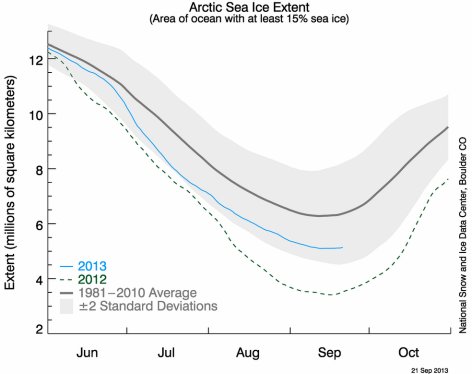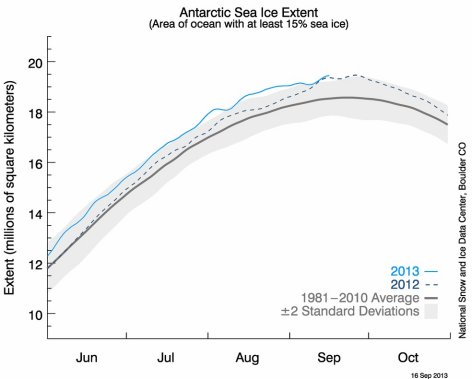
Those who believe that global warming is happening and is caused by people are constantly making predictions about what will happen in the future. Those predictions, however, generally turn out to be incorrect. Not long ago, for example, I showed how miserably the predictions of the United Nations’ Intergovernmental Panel on Climate Change compare to the data, even those that are most friendly to the global warming hypothesis. Well, now that the September equinox has passed, the Northern Hemisphere has officially moved out of summer and is experiencing Autumn. As a result, we can confidently declare that yet another prediction made by global warming advocates has failed.
I doubt that you’ll see this reported in many news outlets, but way back in 2007, Dr. Wieslaw Maslowski, a research professor in the Department of Oceanography at the Naval Postgraduate School, stated that based on his research, the Arctic would be ice-free by the summer of 2013. His prediction was based on a “high-resolution regional model for the Arctic Ocean and sea ice forced with realistic atmospheric data,” and he thought it might be a bit conservative. In fact, he said:
Our projection of 2013 for the removal of ice in summer is not accounting for the last two minima, in 2005 and 2007…So given that fact, you can argue that maybe our projection of 2013 is already too conservative.
Well, as you can see from the graph above, Dr. Maslowski’s “too conservative” prediction has failed miserably. Not only is there ice in the Arctic, there is significantly more ice than there was in 2012. Now, of course, the amount of ice is still way below the average, but it is also way above zero, the prediction that Dr. Maslowski thought might be “already too conservative.”
Now to be fair, Dr. Maslowski did have a caveat in his prediction. He also said:
In the end, it will just melt away quite suddenly. It might not be as early as 2013 but it will be soon, much earlier than 2040.
So even though he said that his 2013 prediction was probably too conservative, he did add a fudge factor, giving himself an additional 26 years just in case the 2013 prediction failed. Of course, I am willing to predict right now that the Arctic will not be ice-free in 2040, and that the ice will not “melt away suddenly.” I honestly don’t know how anyone who studies the earth can think such a thing, since the earth has been designed with all sorts of negative feedback mechanisms specifically to keep it from experiencing rapid environmental changes (see here, here, here, and here, for example).
Once again, while the amount of sea ice in the Arctic is higher than it was in 2012, it is still much lower than the average. Does that mean it’s being melted by global warming? Probably not. After all, while the amount of ice in the Arctic is lower than its historical levels, the amount of ice in the Antarctic is higher than its historical levels, as the following graph demonstrates:

So in the end, whatever is happening to sea ice in the Arctic is not a global phenomenon. As a result, the simplistic notion that global warming is melting the ice in the Arctic is probably not correct. Most likely, the explanation is much more complex, which is exactly what you would expect for an incredibly well-designed system.

In light of this, Popular Science’s recent decision to shut off comments at their website is very interesting. (http://www.popsci.com/science/article/2013-09/why-were-shutting-our-comments)
Wow. That is amazing, TnTexas! I particularly thought this quote was revealing:
In other words, “discussion is okay as long as it doesn’t undermine those beliefs we hold deeply. When that happens, discussion has to stop. I am glad Popular Science wasn’t around during the time of Copernicus or Newton or Joule or Maxwell or Einstein.
We can see that climate change scientists don’t have a track record of accurate predictions.
Do those skeptical of climate change have a history of accurate predictions?
That’s a great question, Winston. I would say that they do. For example, Richard Lindzen has been saying for many years that the computer models are so flawed that their predictions are wrong. This view has been borne out by the data. In general, most skeptics have said that the temperatures will not rise the way the models have predicted, and they have been shown to be correct.
Jay – Interesting information on the arctic sea-ice predictions. Have you seen the documentary Chasing Ice. I found it to be a rather compelling presentation on the loss of glacier ice cover.
I have seen it, Bill. It contains some stunning visuals, but it is rather misleading. First, it shows the retreat of glaciers in the Arctic. That’s not very surprising, since we know the Arctic is warming. However, it doesn’t spend any time on the many glaciers that are growing, such as those in the Himalayas, Pio XI, and many in New Zealand.
The most misleading aspect of the film, however, is that it ignores history. The glaciers in Glacier Bay, which are prominent in the film, have been retreating since 1780, as shown by this USGS map. It’s hard to understand how human-produced carbon dioxide can be blamed for a retreat that started 200+ years ago. That’s probably why the history was never mentioned in the film.